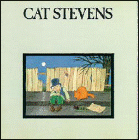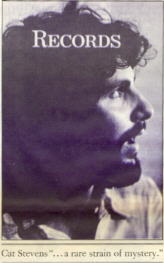 Cat
Stevens Cat
Stevens
- TEASER AND THE
FIRECAT
- RELEASED 1971
" I get the tune and then I just keep on singing the
tune until the words come out from the tune. It's kind of a hypnotic state that you reach
after a while when you keep on playing it where words just evolve from it. So you take
those words and just let them go whichever way they want... "Moonshadow"? Funny,
that was in Spain, I went there alone, completely alone, to get away from a few things.
And I was dancin' on the rocks I get the tune and then I just keep on singing the
tune until the words come out from the tune. It's kind of a hypnotic state that you reach
after a while when you keep on playing it where words just evolve from it. So you take
those words and just let them go whichever way they want... "Moonshadow"? Funny,
that was in Spain, I went there alone, completely alone, to get away from a few things.
And I was dancin' on the rocks
there... right on the rocks
where the waves were like blowin' and splashin'. Really, it was so fantastic. And the moon
was bright, ya know, and I started dancin' and singin' and I sang that song and it stayed.
It's just the kind of moment that you want to find when you're writin' songs." Cat
Stevens to a Boston DJ.
The immediate virtues of
Teaser and the Firecat have become pretty self-evident: it has already yielded three hit
singles. Two of these hits are infectious but basically dreck, and I think their success
can be attributed mainly to production coups. "Rubylove" has a pleasant enough
tune, but it's the novelty of those two Zorbas on the bouzoukis that makes the song.
"Peace Train" has a healthy dose of Cat's characteristic calypso funk, but what
puts you through the windshield those first few times is all that handclapping and bass
drum pedal.
Then there is
"Moonshadow," a simple, unadorned song whose beauty lies in its mystery. I think
that Cat could be dismissed as an ingenious and reliable composer of lightweight hits were
it not for this rare strain of mystery, or puzzlement, that touches most of his finest
songs. "Katmandu," "Longer Boats," and "Into White" are very
vague songs, unfixed in time or space, offering no story line, giving us no handle on the
singer's personality or his emotions. But like Zen riddles, the vivid, exotic images tease
the imagination. This is not the painfully contrived exoticism of the most
pseudo-folk-songs. Nor should the provocative ambiguity of Cat's best lyrics be confused
with the mangled English of his worst. "I'm being followed by a moonshadow." The
phrase is as catchy as "somewhere over the rainbow," yet it doesn't sound
"thought-up," it sounds too original and natural for that.
In one of his new songs,
Cat defines his songwriting method in highly romantic but entirely plausible terms:
"I listen to the wind of my soul." Many of his lyrics seem to go straight from
his subconscious and into the listener's, completely by-passing the intellect. Even in his
early pop star days, many of Cat's short, crude hit songs had the sound of weather reports
from the subconscious. Not having developed much artistry or control, he sometimes let his
thoughts escape in raw pathological form, set to absurdly inappropriate little pop
melodies. For instance, "I'm Gonna Get Me a Gun," with it's
never-to-be-sufficient refrain of "I'm gonna get me a gun,/ And all those people who
put me down,/ better get ready to run."
Then came his TB cure and
two years of searching for satori. By the time he wrote Mona Bone Jakon, he was capable of
achieving a synthesis of self-consciousness and sub-consciousness.
When his girlfriend, who
happened to be named D'Arbanville, left him for Mick Jagger, he wrote "Lady
D'Arbanville." The melody (consciously or not) was very similar to Jagger's
"Lady Jane." In the lyrics, Cat effectively laid Miss D'Arbanville to rest:
"Tho' in your grave you lie, I'll always be with you," etc., etc. Cat had
transmitted his unseemly feelings into a courtly and mysterious ballad that was a hit in
six countries. Courtly and mysterious and so gentle-sounding it makes your flesh creep.
Most of Cat's songs about
women have a weird edge to them, a fact not lost on Women's Liberation. Ellen Willis, the
rock critic of the New Yorker, thinks that "'Wild World' betrays a condescending,
sexist viewpoint." Reverse the roles, she says, and "It's hard to imagine a
woman sadly warning her ex-lover that he's too innocent for the big bad world out
there." True, and that goes for "Sad Lisa," too. If in these two songs Cat
expressed a rather suspect concern for the ladies who were leaving him, in his new songs
("If I Laugh," "How Can I Tell You" and "Bitterblue") he
yearns for ladies who are achingly inaccessible from the outset. All three songs are
lovely, the first two being quiet ballads, the last one a heavily syncopated wail. Taken
as a whole, they express Cat's awe at the power of women, an awe that is old-fashioned and
perhaps tainted with sexism, but which has always been the stock in trade of troubadours.
Once again, the lyrics have a subliminal intensity, as if Cat were putting his obsessions
to music.
At any rate, I prefer those
of Cat's songs that sound as if they had bubbled up from the back of his mind. The more
thought-out ones tend to reveal the working of a staggeringly banal intellect. Cat's
political visions indicates a less than nodding acquaintance with current events.
"Peace Train" at least delivers its simple-minded message in an appropriately
childish tone. "I've been happy lately" thinking about the possibilities of the
future; "I've been crying lately thinking about the world as it is." That
simple. In "Changes IV" however, Cat attempts a full-blown statement of his
world view and succeeds like sounding like the Knute Rockne of the Age of Aquarius:
"And we all know it's better/ Yesterday has past/Now let's all start living/ For the
one that's going to last." Musically, the song is almost a parody of Cat's flashiest
and cheapest tricks, of his tendency to overdramatize a tune with rubato and heavy
dynamics. An absurd flamenco guitar flourish keeps popping up as Cat heralds the new day
when "the people of the world/ Can all live in one room." I know he means
something nice by that, but taken at face value it sounds like a proposal for universal
genocide.
The only lyric on the album
that makes a really sophisticated, coherent statement about the world is "Morning Has
Broken." As Cat announces at his concerts, "Morning Has Broken" was a
"hit hymn" of the Victorian Age. It is a gorgeous hymn, offering God respect and
gratitude in suitably sentimental formal language. It has a grandeur of of diction which
no contemporary song can match. The hymn is absolutely right for Cat; it expresses his
optimism, his reverence, his sentimentality more fluently than he himself can. He sings it
about as well as it can be sung and gives it a dignified piano/guitar/muted chorus
arrangement that is perfect.
Cat's finest songs seem to
spring from self-examination, from his search for a personal ethic; his inner voice speaks
with a complexity and a conviction that his strictly self-conscious efforts lack. The
three most interesting songs on Teaser "Tuesday's Dead," the most spectacular
number on the record, consists of a manic tumble of words ending with the chorus:
"Whoa, where do you go when you don't want no one to know/Who-oo told tomorrow
Tuesday's dead?" I have no idea what the chorus means and neither, as far as I know,
does Cat. On stage, he prefaces the song with some mumbled remarks about New York hotels
being weird and having to tip people and getting caught up in life's trivia. As a whole,
however, the song manages to convey Cat's determination to hammer out a working set of
values the same idea combination of words is gripping, no matter what it
means. The music the irresistible calypso tune, the delayed entrance of the second
guitar, the exclamatory punch of the bass pedal, the classic Jamaican choral work is
Cat at his flamboyant best.
The other two songs are
quiet and peaceful. Both songs use bizarre and Zen-like images to express a resignation to
fate and a simple faith in the future very different from the mindless, cheerleading
optimism of "Peace Train." The moonshadow is a purifying light that will comfort
Cat even in the most terrifying physical trials he can imagine blindness, dumbness and
mutilation. Patient meditation has finally brought him peace, hopefully a lasting peace:
"Did it take long to find me/ I ask the faithful light/ Did it take long to find me/
And are you going to stay the night?" That is a very satisfying lyric, one that works
perfectly on both the real and metaphysical levels. The child-like, traditional-sounding
tune fits the words to a T. The guitar accompaniment by Cat and Alun Davies, and the hint
of tambourine, are just right.
"The Wind" is a
model of economical songwriting, a far cry from the early pop songs in which Cat endlessly
repeated the same trivial verse, padding it out with meaningless breaks. In less than two
minutes, "The Wind" compresses Cat's philosophy and a description of his working
methods into a few mysterious images. The language is beautifully controlled, the melody
is exquisite, the vocal is soulfully phrased, and the two guitars play in elegant
counterpoint. A gem.
Cat has become a dependable
artist, a good artist, but he appears to be one of those composers who does not develop,
who holds no surprises. Given his three albums to listen to for the first time, one would
be hard put to place them in chronological order. They all contain the same themes, same
instrumental texture, and the same sensibility. He has an unmistakable style, a unique
ability to combine sophisticated, commercial melodies with personal, almost primitive
lyrics. As that style is currently big on the market, there is no urgent pressure for him
to change it. One would like to see him develop the polished lyrics of a James Taylor or
the deep resonance of a Van Morrison... But enough carping. His songs, though they may be
small pleasures when they come on the FM radio, are cause for celebration when they come
on the AM. That's enough to ask of Cat for now.
Timothy Crouse, Rolling
Stone, 12/9/71.
( article courtesy of Gerardo Roman ) |